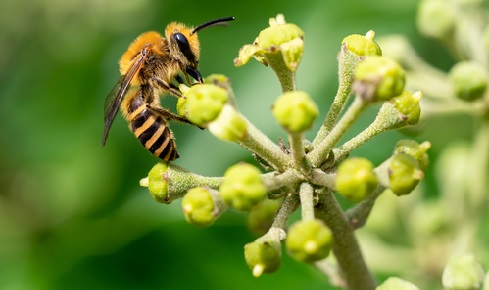The ivy bee, a small species of solitary bee, is making headlines in the United Kingdom. Originally from Southern Europe, it was first spotted in Great Britain in 2001 and has been slowly spreading northward ever since. This unassuming bee has captured the attention of nature enthusiasts and scientists alike thanks to its unique characteristics and ecological role.
As its name suggests, the ivy bee has a particular fondness for ivy plants. In fact, it feeds primarily on the nectar of ivy flowers, which provides it with the energy it needs to survive and reproduce. This specialized diet makes the ivy bee an important pollinator for this plant species, contributing to its reproductive success.
The ivy bee is most active during the autumn months, coinciding with the flowering of ivy. This late activity sets it apart from many other bee species, which tend to be more abundant during the summer. The ivy bee’s ability to forage at cooler temperatures allows it to occupy an important ecological niche and contribute to the pollination of plants that flower at this time of year.
Source: https://www.rsb.org.uk/biologist-features/the-ivy-bee-makes-its-move
Unlike honeybees and bumblebees, which live in large social colonies, the ivy bee is a solitary species. Each female builds her own nest, often in the ground or in hollow stems. She collects pollen and nectar to feed her offspring, ensuring the survival of the next generation.
The arrival of the ivy bee in the United Kingdom is a testament to the ever-evolving nature of our ecosystems. While its presence may raise concerns about competition with native bee species, it’s also a reminder of the importance of biodiversity and the interconnectedness of all living things. As this fascinating insect continues to spread across the country, it will undoubtedly play a vital role in shaping the future of our natural world.
The ivy bee is a captivating example of how nature can adapt to change. This tiny pollinator reminds us of the importance of preserving natural habitats and creating flower-rich gardens to support our bee friends. Each of us can do our part by planting autumn-flowering plants, such as ivy, and creating insect shelters. Together, we can contribute to a brighter future for bees and our planet.
